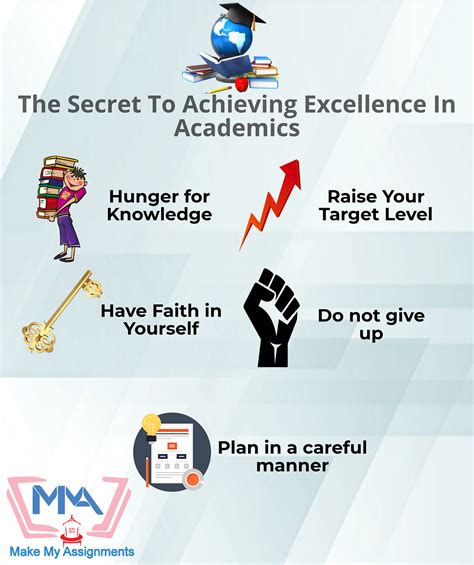Mastering the Art of Education

Academic excellence is not merely a pursuit; it is a pinnacle that requires dedication, discipline, and an unwavering thirst for knowledge. For students who aspire to the summit, the following comprehensive guide will illuminate the path to academic success.
Strategies for Achieving Academic Excellence
1. Establish a Consistent Study Schedule:
Regular study sessions are the foundation of academic achievement. allocate dedicated time each day to review, comprehend, and reinforce what is learned in class. Create a realistic schedule and stick to it, even on weekends.
2. Active Learning and Engagement:
Being a passive recipient of knowledge is insufficient. Actively participate in class discussions, ask questions, and engage with the material. Take notes, summarize what you learn, and teach it to yourself or others.
3. Seek Clarification and Support:
Do not hesitate to seek help when needed. Request clarification from teachers, attend office hours, and form study groups with classmates. Share ideas, quiz each other, and provide constructive feedback.
4. Manage Time Effectively:
Time management is crucial for academic success. Prioritize tasks, delegate when possible, and use technology to streamline activities. Take breaks and avoid procrastination.
Common Mistakes to Avoid
1. Cramming:
Last-minute cramming is ineffective and counterproductive. Spread your study sessions over multiple days, allowing your brain time to process and retain information.
2. Ignoring Class Attendance:
Attending lectures and participating in class is essential. Notes, discussions, and insights provided by instructors cannot be easily replicated through self-study.
3. Selective Studying:
Do not neglect challenging subjects or rely solely on your strengths. Dedicate time to all areas of study, focusing on developing a comprehensive understanding.
4. Lack of Sleep and Breaks:
Adequate sleep and regular breaks are vital for cognitive function. Depriving your brain of rest and rejuvenation impedes concentration and memory.
Why Academic Excellence Matters
- Improved Career Prospects: Higher academic achievement correlates with increased job opportunities, promotions, and higher salaries.
- Enhanced Cognitive Abilities: Academic pursuits strengthen critical thinking, problem-solving, and analytical skills, benefiting all aspects of life.
- Personal Fulfillment: Achieving academic excellence fosters self-confidence, motivation, and a sense of accomplishment.
- Preparation for Higher Education: Success in high school or undergraduate studies lays the foundation for success in graduate school and beyond.
Benefits of Academic Excellence
- Increased Confidence and Self-Esteem: Achieving high grades boosts self-confidence and a belief in one’s abilities.
- Recognition and Awards: Academic excellence is often rewarded with scholarships, awards, and recognition, both within and outside of the classroom.
- Leadership Opportunities: High-achieving students are often eligible for leadership roles in clubs, organizations, and student government.
- Improved Health and Well-being: Studies have shown that students who perform well academically experience lower rates of stress, anxiety, and depression.
Conclusion
Academic excellence is a transformative pursuit that requires dedication, diligence, and unwavering commitment. By implementing the strategies outlined in this guide, students can establish a path to the summit of academic achievement, unlocking endless opportunities for personal growth, career success, and lifelong fulfillment.
